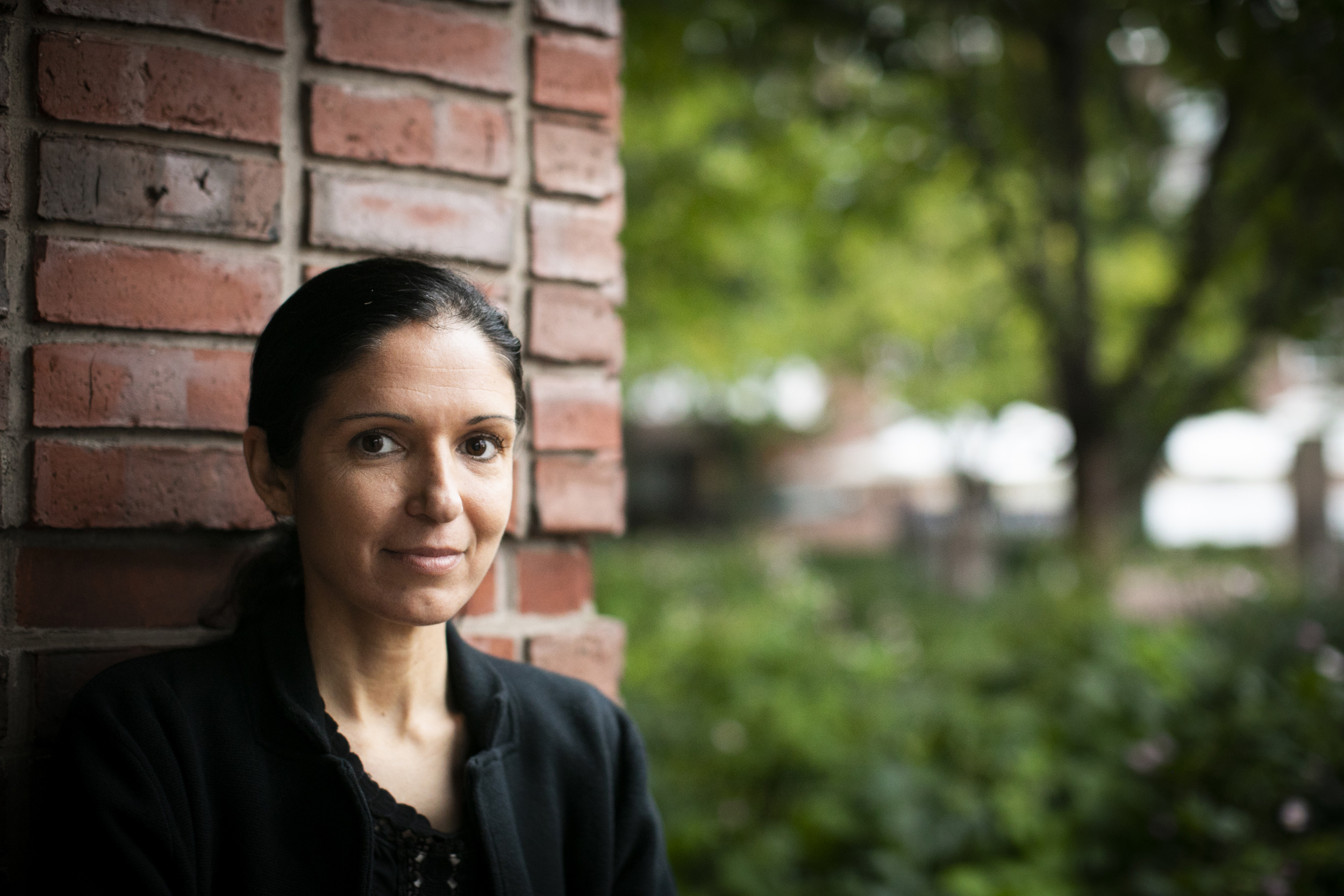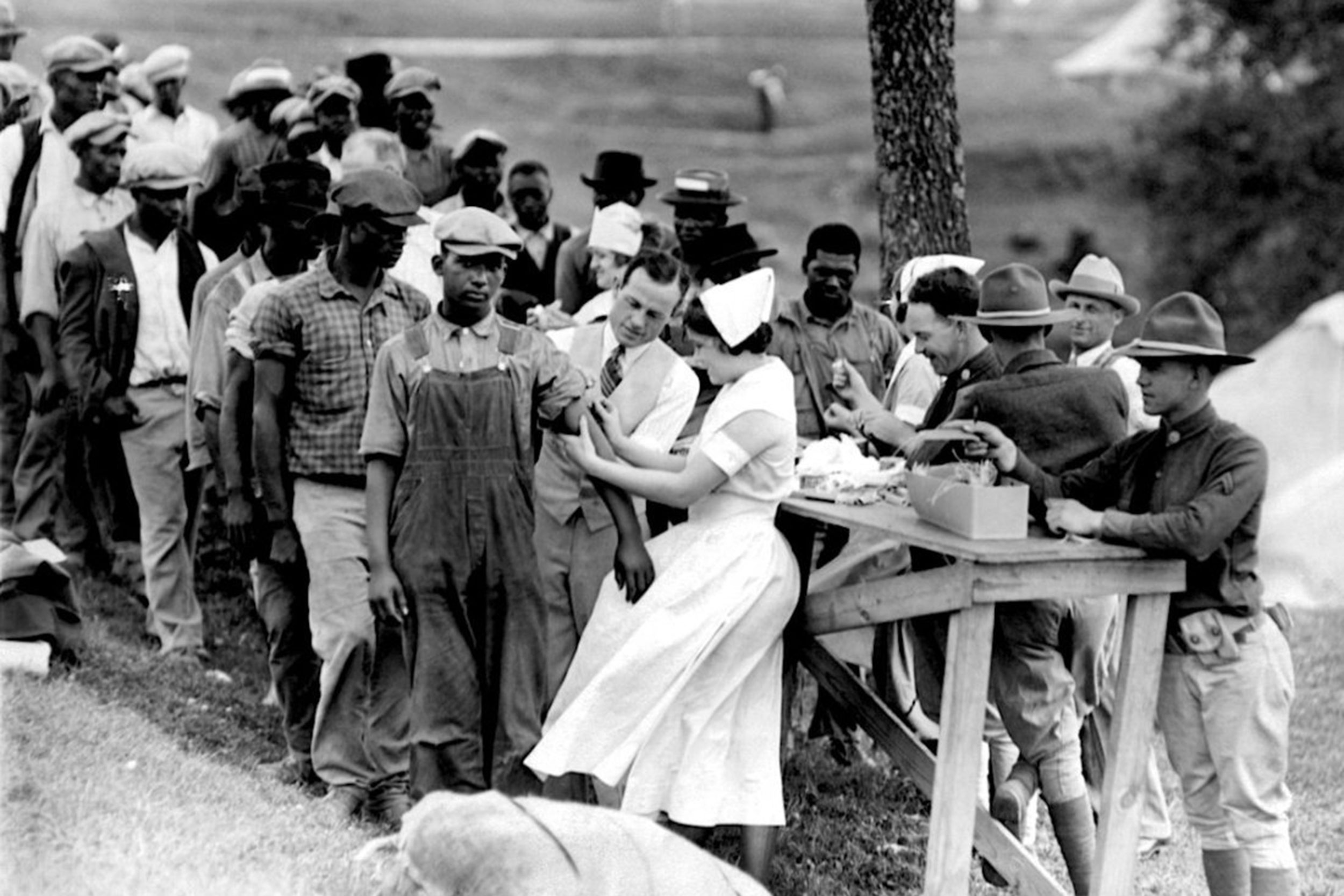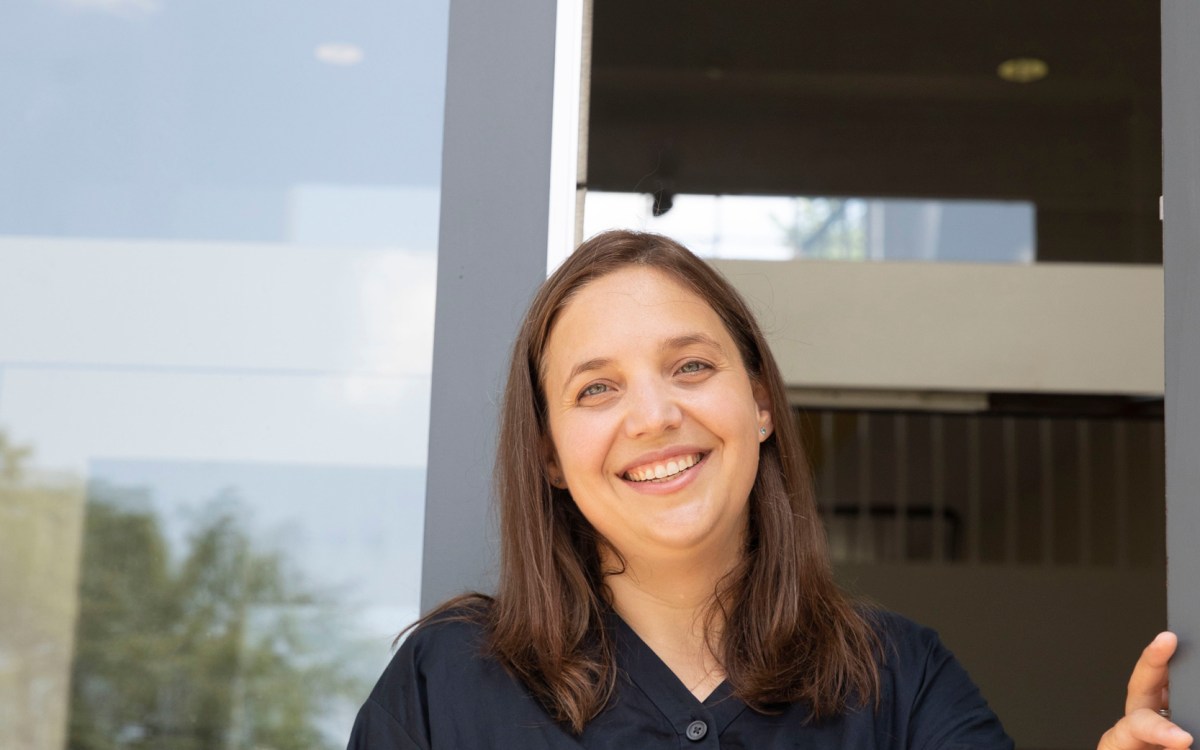
Marcella Alsan said the MacArthur Fellowship will be instrumental in helping further her research.
Stephanie Mitchell/Harvard Staff Photographer
A life’s mission sparked by disbelief over Tuskegee study
Harvard physician-economist Marcella Alsan gets MacArthur for her work on systemic racism, distrust, health inequities
It seemed unbelievable at first.
Marcella Alsan was in Professor Allan M. Brandt’s undergraduate class on the history of medicine and public health in America when she first learned about the infamous Tuskegee study, the federal government’s 40-year experiment observing the effects of untreated syphilis on Black men without their knowledge.
“I literally remember where I was sitting when he was talking about it. It left such an indelible mark on my brain,” said Alsan, who graduated in 1999 with a B.A. in cognitive neuroscience. “I couldn’t fathom it, and that really stayed with me.”
That experience set Alsan off on a career path to look more deeply at the connection between race and health care in the U.S. And this week, the MacArthur Foundation recognized the physician-economist with a fellowship for her pioneering work investigating the roles systemic racism and the mistrust it engenders play in ongoing health disparities.
“I think astonishment doesn’t even begin to describe it,” Alsan said, after learning that the foundation officials who had been pressing her for days, leaving urgent messages about a new initiative involving maternal mortality, were in reality calling to tell her that she had been named a fellow. “I almost fell out of my chair. I was just thinking that this is some sort of practical joke.”
Alsan, who runs the Health Inequality Lab at the Malcolm Wiener Center for Social Policy at Harvard Kennedy School, said the recognition will be “so instrumental” in helping further her research, which has sometimes had difficulty attracting financial support because of its cross-disciplinary nature. (Each MacArthur fellow receives a $625,000 stipend, which they are free to use anyway they wish.)
After college Alsan earned a master’s degree from the Harvard T.H. Chan School of Public Health in 2005 (the same year she received an M.D. from Loyola University Chicago), and a Ph.D. in economics from the Graduate School of Arts and Sciences in 2012.
Alsan’s many colleagues and mentors across the University said the MacArthur honor is well-deserved.
“Her work is amazing. It’s just absolutely amazing,” said David M. Cutler, Otto Eckstein Professor of Applied Economics. “There are tons of people studying health inequities, but none in quite the way she does.”

Research Alsan published in 2018 revealed the enduring injustice of the federal Tuskegee syphilis study, which ran from 1932 to 1972.
Credit: National Archives
One noteworthy example of her unique approach, Cutler said, is Alsan’s 2019 research with colleagues on the effect that a physician’s race had on the health of Black male patients. Alsan’s group created a free clinic in Oakland, California, to test whether Black men would be more inclined to access preventive care, like flu vaccines and cholesterol tests, or to follow up on medical advice, if the doctor was also a Black man. The findings showed patients who randomly saw Black physicians were much more likely to adhere to recommendations than those who saw white ones.
“I’m not sure that I can name a single other person in the world who could have done that experiment,” said Cutler, who served on her dissertation committee.
Colleagues say Alsan has always been interested in the big, seemingly unknowable questions about age-old disparities — why some parts of Africa remained poorer than others, for instance — and dives down into scientific granularity to figure out the why.
“It’s multipronged, always. She’s looking at the causes of these inequities, the impact of these inequities, and, in the case of the causes, sometimes the deeper history,” said Claudia Goldin, the Henry Lee Professor of Economics, who mentored Alsan as a doctoral student writing about how the tsetse fly shaped the course of poverty in Africa.
Take the case of the Tuskegee syphilis study.
Many had long speculated that the Tuskegee study, which ran from 1932 to 1972, indelibly influenced African American wariness of health services and physicians. But it wasn’t until Alsan’s 2018 research that the long-term effects that experiment had on Black men were quantitatively measured, he said.
“Her documentation of the impact of an ethical failure, a fundamental moral injustice based deeply in structural racism, has really opened up a set of inquiries into how we can understand the impact that racism has,” said Brandt, Professor of the History of Science and the Amalie Moses Kass Professor of the History of Medicine. “And what we’re finding right now, in the midst of the COVID pandemic, is that these health disparities have been very persistent; they’ve been hard to address; and they affect the trust of African Americans in public health strategies, like vaccination.”
The kinds of research problems she takes on require someone with her uncommon background. Though unconventional to some, Alsan embraces her identity as a physician-economist interested in infectious disease.
“I love economics. I love clinical medicine. I love clinical infectious disease,” she said, with a laugh. Although they may not seem complementary at first, they are all necessary to identify the root causes of many racial disparities in health and health care, and then to fix them.
“If you’re concerned about health equity, there are two different ways to try to reduce health gradients: One is by physically going and providing care, and another is trying to rigorously analyze what are the causes of health inequality and what are the different policy levers that could be used to reduce them,” she said.
But even with her public health training and a medical degree almost complete, Alsan still did not feel equipped to do the work she wanted to do.
“What motivated me to get the Ph.D. was, as a young medical student, feeling wholly unprepared to deal with the way poverty determines the distribution outcomes of disease,” she said. “And so, it provoked this idea that, ‘Oh. I need more tools.’
“Because if you want to understand how a history of exploitation can generate distrust, can generate low demands, can propagate inequality, you don’t want to randomly assign exploitation or mistrust. You want to leverage our existing history to try to make progress on those types of questions,” she said. “Once I had the tools, I was able to look back to that moment in [Brandt’s] class and say, ‘Wow. We can actually try to quantify this.’”
Reaching out to scholars and practitioners in different disciplines to get at difficult questions in a “holistic” way is a hallmark of Alsan’s approach, said Crystal S. Yang, a Harvard Law School professor and Harvard-trained economist researching COVID-related health conditions in the criminal justice system with Alsan.
In 2020, they partnered with the National Commission on Correctional Health Care to understand COVID’s spread and the pandemic supply needs in 320 prisons across the U.S. Their pioneering research found that prison officers had a higher rate of infection than inmates and that many facilities lacked adequate personal protective equipment, cleaning supplies, or sufficient access to lab testing.
The pair recently began a related study to see whether facilities that undergo formal commission accreditation improve their health care services and whether prisoner health improves as a result.
“She’s the hardest-working person I know and is always pushing people to be better,” said Yang. “She’s always trying to teach the students about the right types of questions to ask, or how to do a certain type of analysis for randomized controlled trials. She’s just such a good role model for younger folks who are interested in doing this type of work.”
“She’s an incredibly caring person. She cares about students. She cares about colleagues; she just cares about people. If there’s an issue going on, she wants to know about it. She wants to help as much as she can,” said Cutler.
Thinking back on her unusual journey to this moment, once an economics doctoral student in hospital scrubs shuttling between Littauer and Longwood to see patients, Alsan said, “I’m just so grateful. Can you imagine? What a special place Harvard is that it would allow someone to do those very different things at the same time. On both sides of the river, people were extremely accommodating and generous and worked really hard to try to help make it happen.”





